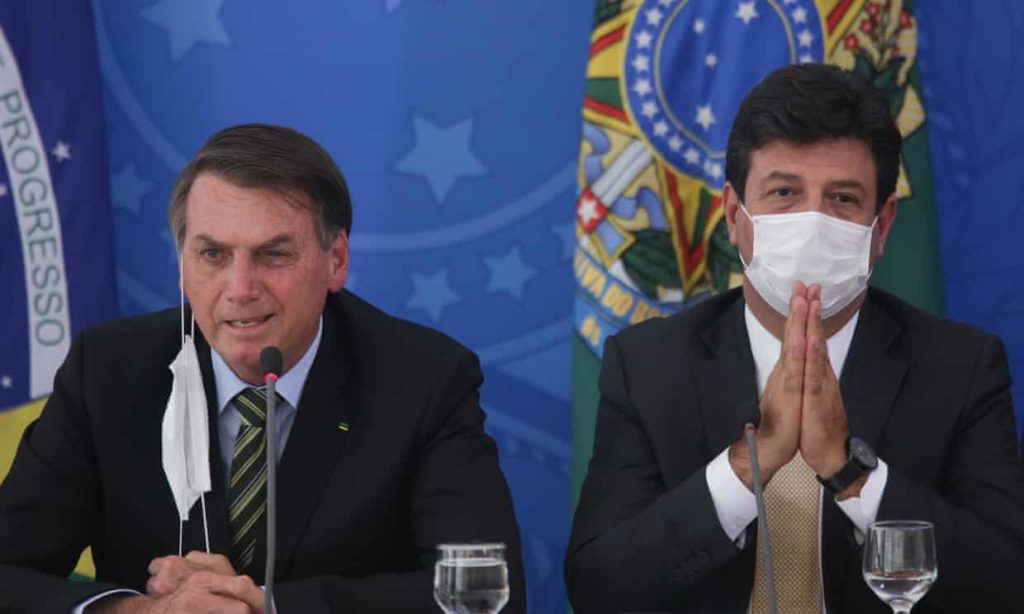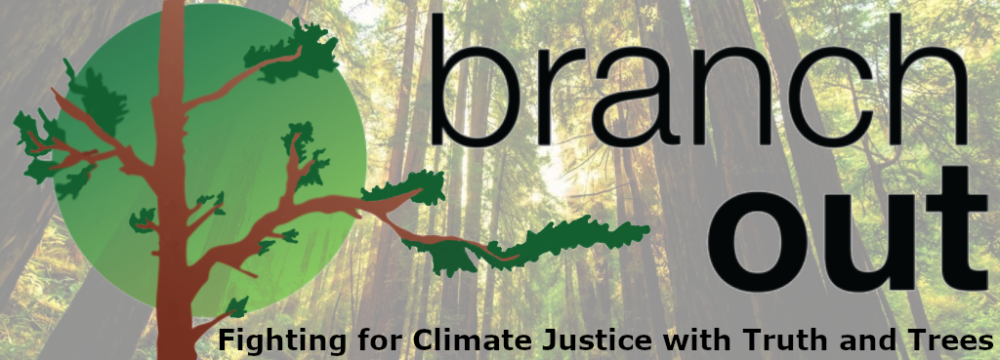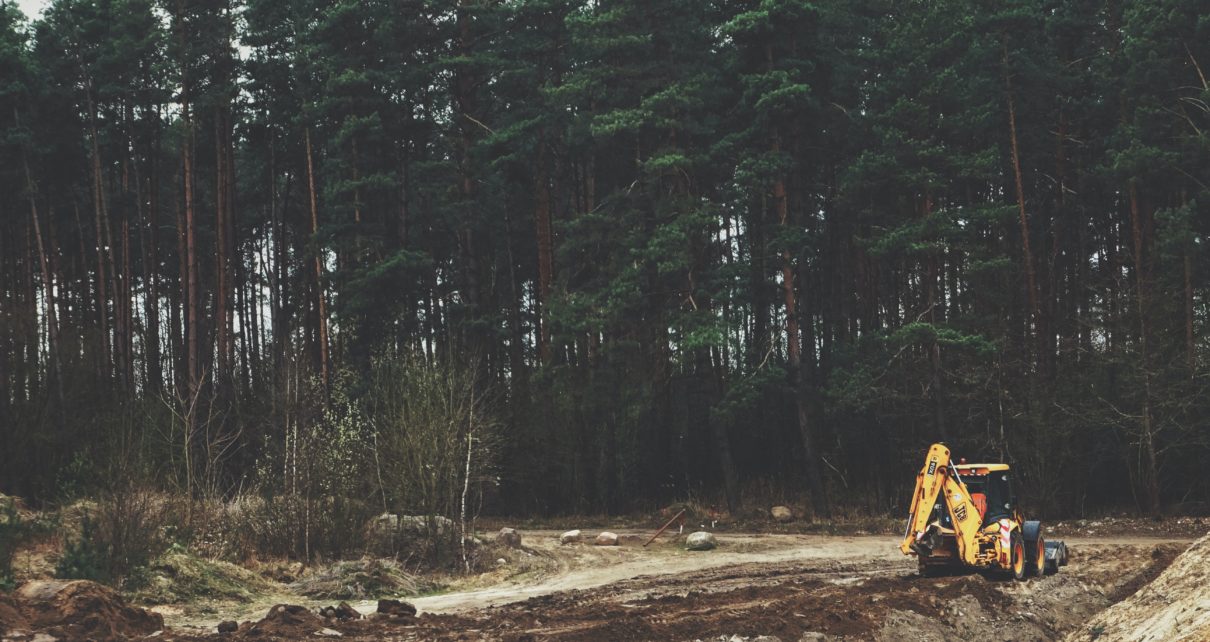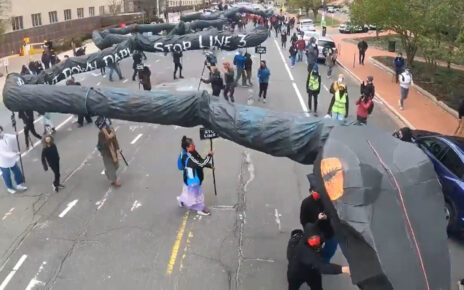Introduction: ‘a little flu’
As the outbreak of the novel Coronavirus, COVID-19, forces governments around the world to enact social distancing measures, Brazil’s president Jair Bolsonaro has consistently downplayed the pandemic. Brazil’s coronavirus response will not only leave many people dead who could have been saved, but it also severely threatens Brazil’s Indigenous population of nearly one million people who also stand on the frontlines of climate collapse.
The number of Indigenous people in the Amazon confirmed to have the the virus has nearly tripled in four days from Monday to Thursday. The mayor of Maunas, the largest city in the Amazonas state of Brazil, also told reporters on April 6th that the public hospitals were already at capacity and could not take any additional COVID-19 patients. Yet nearly $2 million intended to combat the pandemic is still sitting in the account of the National Indigenous Foundation (FUNAI). Not a single penny has been distributed so far to help Indigenous Peoples combat COVID-19.
Bolsonaro, who referred to COVID-19 as “a little flu,” has repeatedly claimed that the media and left-wing politicians are exaggerating the coronavirus in order to hurt him politically, calling the crisis “hysteria.” While Bolsonaro denies that the virus is a serious threat, São Paulo, Brazil’s most populous city with about 30 million people living in the metropolitan area, has become a major coronavirus hot zone.
According to a report in Deutsche Welle, at São Paulo’s Vila Formosa cemetery, the number of graves being dug every day has doubled compared to normal despite the official death count being just over 2100 as of April 17. Researchers from a variety of universities in Brazil, however, have estimated that the number of reported cases accounts for only 8% of the total cases in Brazil.
Hospitals in São Paulo are already hitting capacity with 24 wait-periods for hospital beds reported at some locations. About 1400 frontline healthcare workers in São Paulo have been dismissed from the hospitals and ordered to self-quarantine due to suspected COVID-19 infection. With a shortage of workers, Brazil’s Health Ministry is looking to fast track students in their last year of nursing school or last two years of medical school to immediately join the medical workforce.
Daniel Yokomizo, a programmer living in São Paulo, told Branch Out in an email, “The situation is dire. Brazil seems to be running towards the abyss, we probably are in the top five countries in number of deaths right now, but our rampant under reporting is hiding all that.”
‘To the slaughterhouse’

President Jair Bolsonaro abruptly fired the country’s health minister Luiz Mandetta, on Thursday, April 16, after Mandetta pushed for strict social distancing. While introducing Mandetta’s replacement Nelson Teich, a private health clinic CEO, Bolsonaro said “I know … life is priceless. But the economy and jobs must return to normal.”
Brazilians have protested Bolsonaro’s handling of the COVID-19 pandemic. On Wednesday, Brazil’s congress demanded that Bolsonaro release the results of two COVID-19 tests he has taken after 23 people who accompanied him on a trip to the US in March tested positive for the virus, including several who attended dinner with Bolsonaro and U.S. President Donald Trump at the Mar-a-Lago resort, according to The Guardian.
Former President Luiz Inácio Lula da Silva weighed in, accusing Bolsonaro of “trying to lead society to the slaughterhouse.” In an interview with The Guardian, Lula said, “I think the institutions will need to find a way of sorting Bolsonaro out. And that will mean you’ll need to have an impeachment.”
There is no love lost between Lula, a member of the left-wing Wokrers’ party, and Bolsonaro, whose far-right government has sharply divided Brazil. Lula was the most popular candidate for President until he was put in jail on corruption charges, clearing the way for Bolsonaro’s victory in 2018.
In 2019, however, reporting by The Intercept revealed that the judge in Lula’s case, Sergio Moro, who later became Bolsonaro’s Justice Minister, had secretly worked with the prosecution to ensure Lula would be convicted. Lula has since been released.
Bolsonaro’s call for a return to normalcy in defiance of social distancing is really a call to continue the extractive economics that threatens the Indigenous nations of Brazil’s Amazon region as well as the global ecosystem. Branch Out previously reported how the anti-Indigenous policies of Bolsonaro threaten the existence of Brazil’s Indigenous population who play a pivotal role in global public health.
Illegal mining and deforestation
On Thursday, April 16, Indigenous women from Brazil and other parts of the Amazon rainforest spoke for a panel by The Women’s Earth and Climate Action Network (WECAN) International. Sônia Bone Guajajara, Indigenous leader from Brazil and Executive Coordinator for the Articulation of Indigenous Peoples of Brazil (APIB), spoke with a Portuguese-English translator to the livestream viewers:
“We are in this place right now that we can focus on the prevention and taking care of the COVID-19 but we cannot forget the historical attack we have been victim of so we need to address issues that are a chronic struggle for indigenous people as well as temporary COVID-19 issues”
Only two days before Bolsonaro fired Mandetta, another firing Tuesday at Brazil’s Environment Ministry made headlines because its top enforcement officer, Olivaldi Azevedo, had ordered his team to raid an illegal mining operation on Indigenous territory in the Amazon rainforest. Video of the raid aired on Brazil’s largest broadcaster, Globo, on Sunday, and Reuters reports that multiple sources inside the Ministry agree that Azevado’s ousting was a direct result of the raid cracking down on illegal miners who generally have the support of the President.
Illegal mining has become a serious problem inside the Amazon Rainforest. Logging and industrial agriculture have also fueled the invasion of Indigenous land. While Western media portrays cleaner air as an unforeseen positive effect of the Coronavirus, few have reported that deforestation is up 50% in the Amazon Rainforest over the last three months compared to the same period in 2019.
In addition to threatening the stability of the rainforest ecosystem, illegal mining and deforestation have brought COVID-19 to Indigenous communities. Daiara Tukano, an Indigenous activist from Brazil and coordinator of Radio Yandê, speaking at the WECAN livestream, said: “One of the deaths that we faced of a young boy of 15 years old was caused because of the invasion of illegal mining in indigenous territories.”
Tukano said the Indigenous people have been trying to close the roads into their territory but Bolsonaro’s government has been fighting these efforts. She also reaffirmed that for Indigenous people, the fight against the threat of COVID-19 is a continuation of the fight to preserve their sacred way of life in the margin of Brazillian society at large.
“This is not something new for us – maybe what is new is that we are together this time. I was listening to an indigenous chief remembering that we are facing pandemics for the last 500 years or so, but this time the entire world is facing it. For us, in this panorama of absolute lack of access to health politics and security politics is really concerning when we think of the possibility of having whole indigenous communities under the threat of a very much severe genocide.”
In 2019, in addition to unprecedented forest fires believed to be set intentionally to make way for industrial agriculture, Guajajara people in the Amazon faced the murders of multiple leaders from the group Guardians of the Forest. The pandemic has not slowed the violence, as another Guajajara leader was killed at the end of March.
‘Mother Earth’s Providence’
Despite the real threat of genocide, the Indigenous women who spoke remained optimistic that they could persist by retaining physical distance while achieving social solidarity and action. Sônia Bone Guajajara said, “We need to exercise our solidarity abilities and to understand the moment as mother earth’s providence,” later adding, “it is time for us to come back to ourselves, and think how much it is time to strengthen our collective fight for a new society, for a new planet, where we all respect each other and have empathy toward each other.”
Bolsonaro’s commitment to the anti-indigenous policy of economic development in the Amazon region shows how far governments will go to perpetuate extractive capitalism even in the backdrop of a global pandemic. Brazil’s coronavirus response is not flat-out denial; it is the belief that capitalist economic growth is more important than life itself.
Indigenous people in Brazil’s Amazon can see COVID-19 as a continuation of their ongoing struggle because their lives have long been expendable to invaders willing to destroy them and the rainforest in order to gain a profit. Everyone should be watching the situation because, in addition to being victims of glaring human rights violations, the people living in the Amazon play a major role globally by protecting the Amazon rainforest.
Studies have shown that the Amazon rainforest affects precipitation across the western hemisphere. Moreover, the rainforest sequesters massive amounts of CO2 from the atmosphere, making it one of the most important natural carbon sinks in the fight against climate change.
In our last Friday Forecast, Branch Out reported on dieback, an imminent tipping point at which the Amazon would become so deforested that the entire ecosystem collapses, triggering an enormous release of CO2 which would accelerate global warming and cause widespread drought. In addition to the effects on the climate, deforestation will likely increase the frequency and intensity of future infectious diseases because it facilitates the transfer of pathogens from animals to humans.
With so much at stake, these Indigenous women leaders are working with WECAN to grow the movement to boycott and divest from the companies financing the destruction, and get critical resources to communities that need them. Patricia Gualinga, a Kichwa leader from Ecuador and spokeswoman for Mujeres Amazónicas Defensoras de la Selva, told the livestream:
“Right now we can say the indigenous communities are heroes and have knowledge in protecting our land but we also need support. Make sure the communities fighting this are provided with their basic needs … Sarayaku People – as the people of the Amazon – make sure other people are aware our forest is living, it has rights as you have rights, forest rights, nature’s rights. Live by these proposals and take action.”





One Reply to “‘To the slaughterhouse:’ Brazil’s coronavirus response could serve millions to jaws of capitalism”